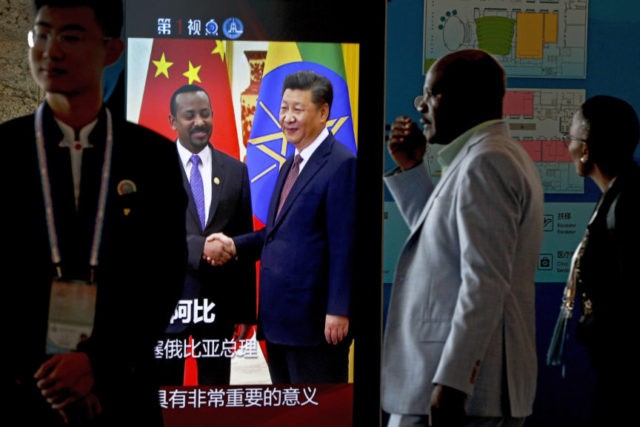China’s Global Times newspaper published a commentary on Sunday, complaining that Western countries warning of debt traps Beijing is setting in impoverished African countries seem “like a loser covering up its own problems,” namely that “African countries do not want to be enslaved to the outside world anymore.”
The piece was published in anticipation of the 2018 Beijing Summit of the Forum on China-Africa Cooperation, which began on Monday. A significant number of African heads of state, including Kenyan President Uhuru Kenyatta and Nigerian President Muhammadu Buhari, traveled to Beijing this weekend to attend the forum. Chinese Communist Party leader Xi Jinping spoke on Monday, announcing more favorable loan offerings for African nations to participate in One Belt, One Road (OBOR), China’s international infrastructure domination project.
Western countries, particularly the United States, have warned African countries not to take out exorbitant loans at high interest rates from the Chinese government, which has already used such policies in places like Sri Lanka and Djibouti to take control of major transportation hubs and territories. In response, the Global Times proclaimed on Sunday that the West is merely experiencing “sour grapes” over seeing African leaders flock to cooperation with the Chinese.
“Western media and politicians … are picking holes in China-Africa cooperation, venting sour grapes instead of reflecting on why the US and Europe’s collaboration with Africa has dropped behind,” the propaganda outlet claims. “The fundamental problem of Westerners is that they used to look down on Africa, treating the continent as US’ and Europe’s backyard.”
“Western media deliberately portray Africans in misery for collaborating with China and they appear to have discovered big news by finding occasional complaints in the African media about Sino-Africa cooperation,” the Times admits, uncharacteristically noting that China’s expensive projects on the continent have attracted their share of domestic naysayers. “One cannot help but say that the West seems like a loser covering up its own problems by cursing others’ progress. The once-mighty West is not supposed to degenerate like that.”
The publication notes also that many have called the OBOR projects in China “neocolonialism,” dismissing these claims as “made up rhetoric” fueled by Western envy. Yet many of these complaints come from the countries impacted by China’s presence. In Kenya, local workers hired to help with the construction of a Chinese-funded railroad have described their experience as a form of “neocolonialism,” as native Kenyans are forced to eat lunch separately from Chinese workers, take different buses to construction sites, and barred from essentially all skilled labor. In South Africa, columnists accused former president Jacob Zuma of turning the country into “China’s lapdog.”
The Global Times’ defensive stance comes as Xi opens this year’s Forum on China-Africa Cooperation, meant to be a large-scale sales pitch for OBOR. Xi delivered the summit’s keynote speech on Monday, promising a series of eight initiatives meant to expand ties with Africa that include “industrial promotion, infrastructure connectivity, trade facilitation, and green development,” according to another state outlet, the People’s Daily. Among the proposals Xi outlined were the development of a trade expo to attract Chinese businesses to Africa, an increase in African imports to China, and cultural exchanges to promote Communist Party-approved Chinese culture in Africa.
Addressing the global protests surrounding China’s high interest rates on its loans, Xi also announced “China will exempt certain African countries from outstanding debts incurred in the form of interest-free Chinese government loans due by the end of 2018,” Xi announced. Most of the projects that African countries have signed onto will take years to complete, however, meaning they are only receiving a three-month respite from high interest repayment on loans that will likely burden them for decades.
China’s OBOR project received support from United Nations Secretary-General Antonio Guterres, who conducted an interview published in the People’s Daily on Monday.
“I am very delighted to have this opportunity to participate in the summit of [Africa-China Cooperation] and my main objective of this trip is to show that I am much committed to the success of south-south cooperation and the importance of China-Africa partnership to promote multilateralism,” Guterres reportedly said. “I am a true believer that Africa’s success is vital to world peace and development, and Africa’s success is inseparable from cooperation with China.”
The campaign to promote China’s growing influence in Africa faces a torrent of criticism that grew to a global outcry last year following the Chinese government’s decision to broadcast a comedy skit featuring blackface on state television. Beijing insisted that painting Chinese actors’ skin color and having them perform offensive African stereotypes was meant to honor the countries the communist government is currently indebting beyond their means, though many in Africa did not accept that explanation.
Individually, Kenya is high on the list of countries most affected by OBOR. Kenya signed onto a project called the Standard Gauge Railway, intended to ultimately connect Kenya to Tanzania, Uganda, Rwanda, and the Democratic Republic of Congo’s border. While financial concerns have alarmed many in the country, the outrageous treatment of Kenyan workers on project has garnered the most prominent headlines.
“In recent weeks, Kenyan media have been awash with reports and images of what appears to show Kenyan workers being mistreated by the Chinese builders of the Standard Gauge Railway that was launched in 2017. One image showed dozens of workers lying on their stomachs,” Voice of America reported in July. Workers complained that all instruction manuals were in Chinese characters, preventing Kenyan workers from participating in higher-paid skilled labor jobs, and black Kenyan workers were strictly segregated from Chinese transplants hauled in to control the project by Beijing.
Kenyan officials dismissed the accusations of racism and abuse, challenging the “work ethic” of native Kenyans and urging them to accept “military standard discipline” from the Chinese.
Kenyan President Uhuru Kenyatta arrived in Beijing Saturday for the annual forum.

COMMENTS
Please let us know if you're having issues with commenting.